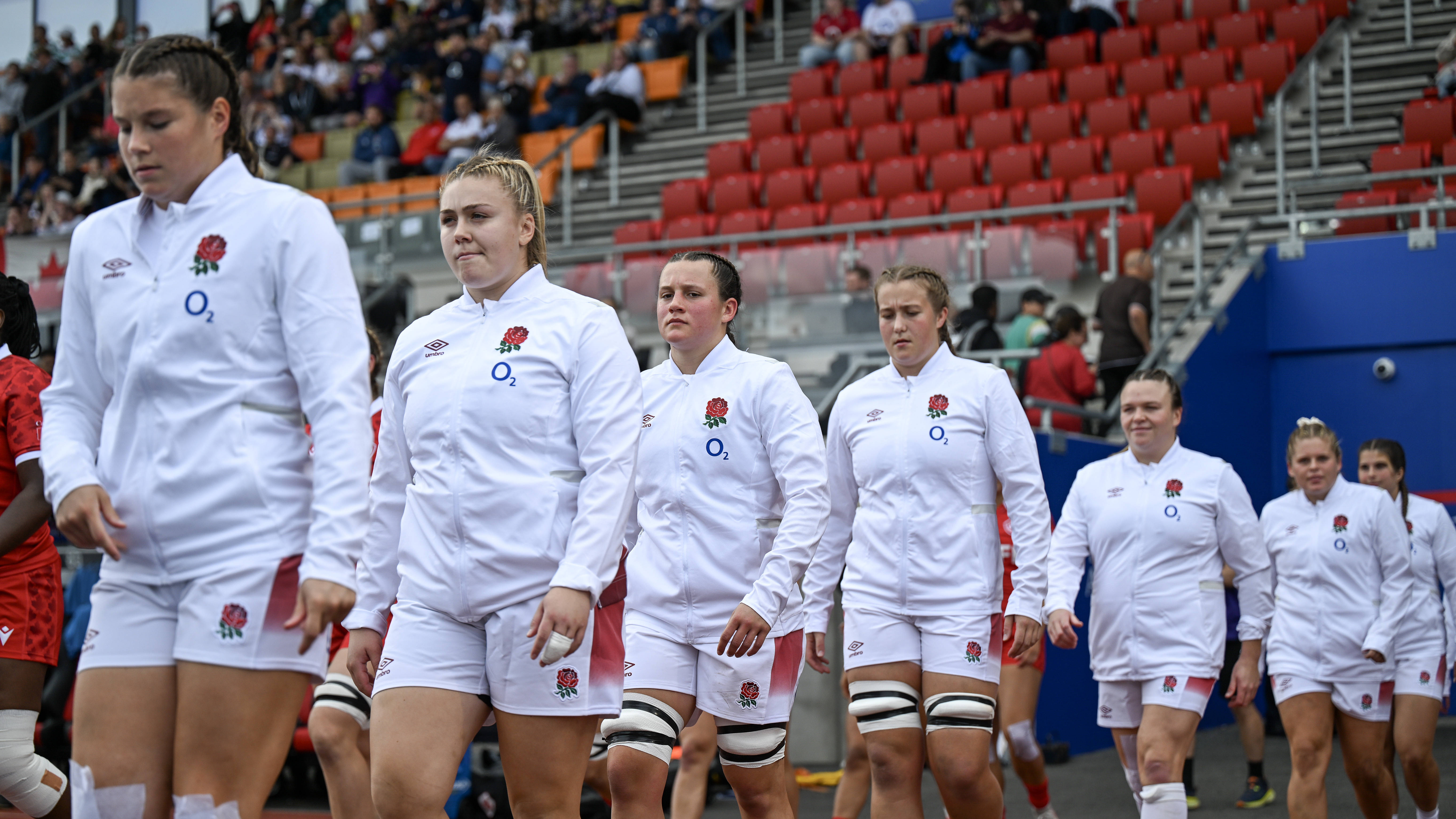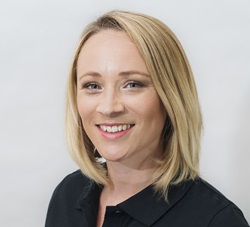

 Growing up with a passion for rugby, Lynsey Hyslop joined the Rugby Players Association as a Personal Development Manager (PDM) in 2012 working with Northampton Saints and Leicester Tigers men’s teams. During her time with the RPA she has progressed to Senior Personal Development Manager and after having her second child, she returned to the RPA as Senior Personal Development Manager for England Women. She is currently based with the team in camp whilst they continue their Six Nations campaign.
Growing up with a passion for rugby, Lynsey Hyslop joined the Rugby Players Association as a Personal Development Manager (PDM) in 2012 working with Northampton Saints and Leicester Tigers men’s teams. During her time with the RPA she has progressed to Senior Personal Development Manager and after having her second child, she returned to the RPA as Senior Personal Development Manager for England Women. She is currently based with the team in camp whilst they continue their Six Nations campaign.
It’s interesting because each of the RPA’s PDMs has taken a different route into the role. My background was initially working in a Male Category C prison specialising in resettlement for serving prisoners before managing an alternative education provision, but I always wanted to get back into sport having previously been a gymnast. I carried out a Sport and Exercise Psychology Masters whilst juggling full time work driven by the determination to secure a position in sports working directly with athletes. When the position at the RPA came up it seemed like a natural progression and I joked that I had swapped male prisoners for male rugby players as there was a lot of similarity helping them both preparing for release into the outside world. All my experiences and interests seamlessly aligned with the role, making me feel incredibly fortunate.
This is the first time that a PDM has integrated into the training camp and so there is no blueprint for me to follow. I’m here to foster relationships and build up a relationship of trust and rapport with the players and key members of their support team. I’m an independent resource who can help players in a range of areas – helping them to upskill, gain qualifications, provide guidance, encourage and support in different aspects of their lives. There is a significant focus on wellbeing as there are so many issues that players face in a high performance environment from injury or squad selection concerns to contracts and career transition.
The Head Coach John Mitchell is very supportive of holistic development of the players and thankfully being integrated into camp gives me the opportunity to learn a lot about the environment and the best ways I can bring in practices to help the players and where I can have the best impact. Some sessions will be informal conversations over lunch or we’ll book in one-to-one sessions and looking ahead, planning group sessions outside of camp either online or at the club.
With the broader PWR players, there’s a lot more within career transitions for players which need to be catered for differently and therefore there is more consideration of dual career and the pressures that brings. If a players’ Red Roses full-time contract is not renewed, they may have to go back to a part time dual career whereas men would still have their full-time club contracts. As a result a lot of the women are highly educated, qualified and experienced. Therefore, players commonly explore ways to leverage their name and brand in order to advance their second career and I hope to be that person that they can come to for independent advice, support and encouragement.
One thing with the women is that many of the older players have been through the semi-pro era whilst younger players have only known full-time contracts so it’s good to harness the experience of older players so that everyone is open to talk about what they’re doing outside of rugby. The head coach supports this holistic approach as ultimately a happy person is a happy player and that positively impacts performance. It doesn’t have to be one or the other and players can use their status to open up doors and life outside of rugby, it’s hugely encouraging.
No player has come to me yet to talk about thinking about becoming a mother but I have had conversations with some of those that do have children about the challenges. In discussing this, I've found that athletes who are also parents face unique challenges. For instance, after a training camp, athletes can be advised to prioritise rest and recovery. However as a parent myself, I understand firsthand that family commitments often take precedence over personal needs and I know my two children would still want me to run around with them and play with them as soon as I walked in the door no matter how tired I was.
While appreciating my situation may differ (as I am not an elite athlete!), it’s something to be mindful of. It's essential to acknowledge that parents may have additional responsibilities to manage alongside prioritising their well-being. Providing a supportive environment where athletes can address these challenges is crucial. It’s been great to see the awareness demonstrated by the Red Roses coaching and support staff, who recognise and accommodate the diverse needs of players, both on and off the field.
We now have the RFU Maternity policy which two players have benefitted from which is a huge step forward in the women’s game. One of the new mothers has been the subject of a documentary about her journey returning to playing and the other had twins and called time on her rugby career. This clearly shows just how different it is for every athlete and every parent; it’s often not just a matter of having children but who you have them with, where they’re at in their lives, what support network they have around them (for both the children and the parents!) and how you ensure that players can have the right conversations to ensure provision is in place for their needs. It’s really rather complex and such an individual situation and you never really know what’s going happen until the children arrive so it’s a continual process and a continual conversation to have.
Being engrained in a high-performance environment is such a career highlight for me. I feel so honoured to experience that and see the ripple effect of working with the players. Seeing someone develop a passion beyond rugby and the positivity that can bring and hearing from the player how that has helped them is incredible. A lot of people in sport are very humble, but being in women’s sport right now is so exciting as they’re on a wave and they’re gaining more profile and being able to help them recognise and find the opportunities to benefit themselves and the game is really great.
It’s great working with the players in camp but that’s only for short, intense periods and then they return back to their clubs which are all over the country. Previously when I worked with the men in just a couple of clubs I was able to base myself there but now I have to find different ways to reach the players and provide the support they need.
As a whole, what I’ve noticed in female sport is there are so many people who want to collaborate and share knowledge and resources to help women’s sport, the PPF is a prime example of that. I want to harness that and do everything I can to help increase awareness of the amazing sport females are playing and provide opportunities to see how entertaining the players and the sport are. I think it’s about utilising the players’ interests and doing things a bit differently, the female players are often very creative, very relatable and want to do things differently. I want to help them get their characters and personalities out there whether it’s putting them in front of different contacts or businesses or trying to find different opportunities for them to have a voice. The Red Roses Instagram is an example of what social media can do and how they can engage with a different fan base who are looking for something different that they don’t necessarily get in the men’s game (I’d highly recommend you follow them on Instagram if you don’t already!)
I think it’s to constantly learn, I don’t necessarily mean qualifications wise but by taking advantage of opportunities and experiences on a day-to-day basis and learn from them. It’s important to self-reflect, be self-aware and say yes to things. You never know what it will do for your enjoyment of your career and your future.
I have two children, two lively dogs and a supportive husband to keep me busy and in my spare time I enjoy running and I also host my podcast which has been a great way to reach new audiences and focus on career paths which aren’t so obvious to players.